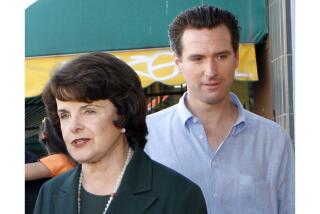String of Races Awaits Appointed Senator : Bentsen successor faces as many as four elections in two years to keep his seat.
- Share via
HOUSTON — Once again, it is blood-on-the-floor time in Texas politics.
It is politics as a contact sport, politics as an endurance test. The arena this time is the race for the U.S. Senate seat vacated by Democrat Lloyd Bentsen, chosen by President-elect Bill Clinton to be the new Treasury secretary. And what it means is that during the next two years there will be at least three and possibly four elections for the Bentsen seat.
It all started Tuesday when Gov. Ann Richards, herself no stranger to the political brawl, announced that Texas Railroad Commissioner Robert Krueger was her selection to fill the vacated Senate spot. Krueger, a former congressman and onetime college teacher, has twice tried and failed to win election to the U.S. Senate.
For his trouble, Krueger will now have to spend the next 23 months campaigning to win a full term. First, he will have to campaign for a special election in May because Texas law requires that a special election be held soon after an appointment to fill a vacant Senate seat. After that election, there will no doubt be a runoff of the two top vote-getters.
Bentsen’s term would have ended in 1994, so if Krueger manages the first hurdles, he will only have time to catch his breath before running in the 1994 primary--unless, by some strange circumstance, he is unopposed. Finally, there will be the 1994 general election.
It is already probable that Krueger will face competition from his own party through the first round leading up to the May election. Perhaps the most dangerous of the possible opponents could be Jim Mattox, the junkyard dog of Texas politics whose principal strategy during the last gubernatorial campaign--in 1990--was to hammer on the accusation that Richards had used drugs while holding elective office.
Richards beat Mattox in the primary that year and went on to a slugfest with Republican Clayton W. Williams Jr., who lost mainly because of ill-timed quips and his refusal, in the last days of the campaign, to shake Richards’ hand.
The rift between Richards and Mattox has continued for the last two years and was evident when Mattox was not even asked if he had any interest in the Senate job.
Although Krueger’s appointment gives him the upper hand, former Agricultural Commissioner Jim Hightower said that, if Mattox gets into the race, he has the ability to overtake Krueger.
“It’s going to be a mud fight,” Hightower said. “If he (Mattox) does get into it, I think it will make him a front-runner.”
But Texas Lands Commissioner Garry Mauro, himself a Democrat, said Mattox would only be hurting himself by going up against Richards’ choice.
“So the question is whether Mattox is going to commit political suicide and run against not only Bob Krueger, but also Ann Richards, the state Democratic committee, the national Democratic Party and the Clinton Administration,” Mauro said. “So, the way I see it is that in the final analysis we may see some dancing around, but Krueger will be the only serious Democrat running.”
Perhaps so, but Mattox on Tuesday was showing signs of being a candidate.
“Bob Krueger is a nice man. He’s articulate and eloquent,” Mattox said in a prepared statement. “But he’s also got to stand behind a voting record that goes against everything that rank-and-file Democrats believe in.”
Meanwhile, Fred Meyer, the Texas Republican chairman, said his party’s best shot is for a number of Democrats and only two Republicans to enter the race. Under Texas law, members of both parties are on a single ballot. If no one gets a majority of the vote, a special runoff election is held between the top two vote-getters. Meyer said the best hope, then, is for the Democrats to cancel each other out and leave the two Republicans at the top of the heap.
“If it quickly becomes four Democrats, then Meyer will rest easy and say, ‘Have at it, y’all.’ ” he said.
Whatever happens, the special election is likely not to be a repeat of the one in 1961, when Lyndon B. Johnson gave up his Senate seat to become vice president. In that race, 71 people declared their candidacies.
More to Read
Get the L.A. Times Politics newsletter
Deeply reported insights into legislation, politics and policy from Sacramento, Washington and beyond. In your inbox twice per week.
You may occasionally receive promotional content from the Los Angeles Times.










